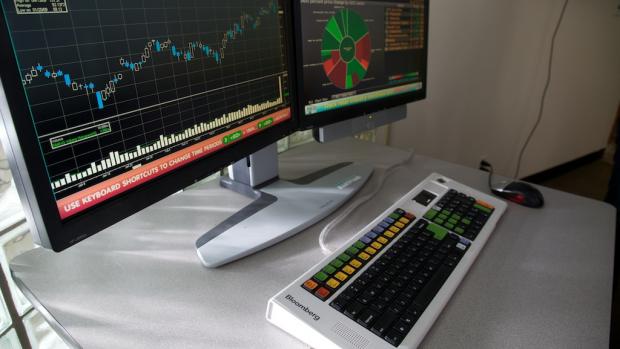Bloomberg Terminals Strengthen Department of Finance and Risk Engineering’s Theory-to-Practice Approach

The Department of Finance and Engineering (FRE) has recently transformed its seminar room in Rogers Hall into a modern day financial lab. Inside it are nine newly-acquired Bloomberg terminals that provide access to real-time financial data and news. The terminals are serviced by Bloomberg LP, and “even though they are ubiquitous on Wall Street, very few academic programs have even a single Bloomberg terminal; we have 12,” says Dr. [USER:71|profilelink], an assistant professor in the department. A handful of the terminals have also been added to the department’s classrooms in lower Manhattan.
The acquisition means students gain valuable exposure to an industry standard, which is an advantage Asha Paul, a second-year FRE graduate student, credits to the department. “Having Bloomberg skills is considered a plus by most of the recruiting people out there,” she says. Students can monitor up-to-the-minute trades and regulatory changes, as well as tools provided in a variety of media – TV, radio, print, and electronic. “Without those terminals, I don’t know what we’d do,” says Paul.
Dr. [USER:389|profilelink], FRE department chairman, understands the needs of employers and jobseekers, explaining, “We are making sure that our students can assume competitive positions in the best and the most prestigious financial firms. The Bloomberg certificate [that our students are required to have] is another plus on their CVs.”
One Element of Many
Yet while he understands the value of the terminals, Dr. Tapiero cautions those who would solely rely on them. “Bloombergs are not an essential element. They’re one of the means we use to prepare our students to face the many challenges of financial engineering.”
Indeed, the department, which offers a master's degree in financial engineering, as well as certificate programs in financial technology management, risk management, and financial engineering, features a range of educational opportunities. Students in the master’s program take core courses and then choose from one of four specialty tracks: Corporate and Financial Markets, Computational Finance, Technology and Algorithmic Finance, and Risk Finance (including credit risk and derivatives, insurance and financial risk management). With their vast storage of past and current information, the terminals will support each of the degree tracks, as well as student and department research.
As Dr. Tapiero explains, “Finance is about information. Finance and information is a marriage that can’t be broken, and students have to understand what information is, to appreciate and use it. Finance changes every time there is new information that alters the world of finance. It is a very, very dynamic environment.”
He likes to remind students that the terminals are machines. “Similar to a car, if you don’t know how to drive, it won’t take you anywhere,” he says. “From an educational and practical point of view, information is an essential input to everything we do in finance. The rest is [understanding] how to use quantitative and econometric knowledge to prepare the future engineers of finance.”
Productive Results
That approach of bridging theory and practice has long been the defining characteristic of the department, which regularly receives top rankings in the popular Social Science Research Network. With more than 81,000 downloads of its research paper series (launched only a year ago), the department is clearly producing work significant to its academic and professional audience.
The addition of the Bloomberg terminals will only boost the capacities in the department for research and education. Lulu Li, an international student and alumna, indicates that while many of her classmates have joined financial firms in the U.S., others have returned to their native China after graduating last spring. Li took a job with the department to train students on the terminals. “The finance and engineering here is very developed, and I want to learn as much as possible,” she says.
Remaining with the department and gaining continued experience with the terminals will help Li reach her goal, believes Paul, because familiarity with the terminals isn’t just résumé filler. “It is part of an education that seeks to bridge the theory of finance with the practice of financial engineering,” she says.




